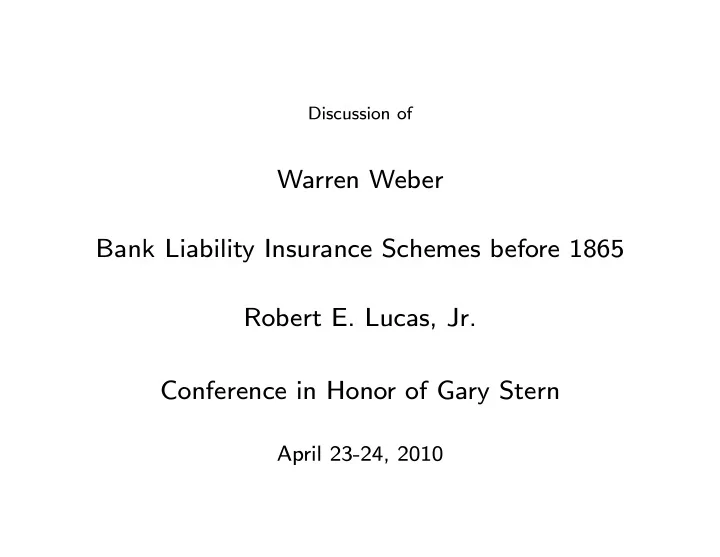

Discussion of Warren Weber Bank Liability Insurance Schemes before 1865 Robert E. Lucas, Jr. Conference in Honor of Gary Stern April 23-24, 2010
• Paper deals with period 1830 -1860 in U.S. • No national bank • Individual banks issued banknotes, redeemable in gold/silver • Think of 1 or 2 stand-alone banks per town • Not much government supervision, regulation, all at state level • Free banking era
• WW has series of papers describing enormous variety of banking prac- tices within and across states • My only source of information on the period, so I hope he got it right • Can we use this era as source of information on e ff ects of supervision, regulatory policies on bank behavior?
• Free banking era decentralized, but imagine ultimate monetary decen- tralization: • Suppose every family or business holds gold and silver coins for all transactions purposes • No banks, no bank runs, no panics in this society • But payments are not perfectly correlated across agents so there are gains to everyone from pooling cash fl ows economizing on specie: frac- tional reserve banking
• Also have bank runs, bank failures–inability to redeem notes • Too big to fail? Apparently not. • How bad was it when only bank in town failed? • Did notes continue to circulate, have positive value? Did notes from other towns circulate? • In any case, independent local banks did not exhaust gains from pool- ing of transactions risks
• These gains never exhausted: force for ever larger banks • Captured in Baumol’s inventory model of cash management; many successors • Easy to see these forces in U.S. banking after 1980s liberalization • In free banking era WW describes, bank sizes remained limited (by law? by o ff setting diseconomies?) • But scale economies can still be realized by associations of indepen- dent banks • How? Paper discusses variety of ways
• Su ff olk Bank System in New England discussed in detail, here and in earlier work • Sophisticated, fully private association • Large banking provided clearing services for many • O ff ered overdraft privileges that permitted smaller reserve/banknote ratios • Su ff olk bankers monitored assets of system participants
• But main focus of paper on government operated or sponsored systems for pooling • Mostly “public options”, not government monopolies • Insured banks competed with banks that opted out (Indiana the ex- ception) • Paper studies failure rates of banks involved in di ff erent arrangements • Lots of variety: natural experiments?
• Do pool members fail less often than non-members? • Hard to see systematic di ff erences in failure rates across systems • Systems where bankers monitor other banks, have a stake in their behavior (Su ff olk, State of Indiana) seem to have lower failure rates than others • Internalization of external e ff ects?
• But don’t want to view low failure rates as equivalent of improvements in welfare (nor does WW suggest this) • Pooling arrangements enlarge opportunity set for coalition of banks • O ff er possibilities for reduced specie reserves, higher asset returns, lower service charges as well as more safety • Which will banks, customers choose? • Think we need more theory–probably more data, too–to answer this
• Clear message of examples from free banking era is that larger bank size is not the only way to realize scale economies in cash management • Associations–private or government-run–among smaller banks o ff er practical alternatives • Believe that today’s repo market, involving limited number of banks and broker/dealers, fi ts right in with WW’s examples • Participants do huge volume of asset trading, requiring huge amount of settling or clearing • Repo market lets them economize on reserves
• In yesterday’s WSJ, Alan Blinder asks ”Why swaps? Why don’t they just use cash?” • Good question, but it has a good answer: • Cash is a low return asset and you want to hold as little as you can • Bankers in the 1840s understood this well.
Recommend
More recommend